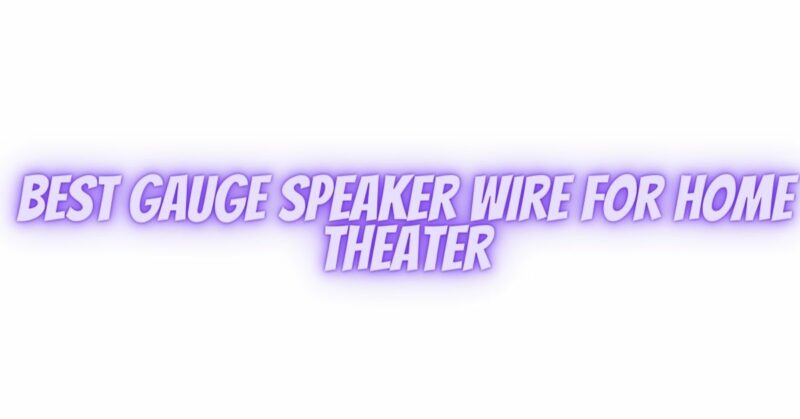Creating a home theater with exceptional audio quality requires careful consideration of various components, and one often-overlooked element is the speaker wire gauge. The gauge of your speaker wire can significantly impact sound quality in your home theater setup. In this article, we will guide you through selecting the best gauge speaker wire for your home theater, taking into account factors like distance, power, and speaker impedance.
Understanding Speaker Wire Gauge
Speaker wire gauge refers to the thickness of the wire’s conductive core and is measured using the American Wire Gauge (AWG) system. In this system, lower AWG numbers correspond to thicker wire, while higher numbers represent thinner wire. The choice of wire gauge is essential because it affects the wire’s ability to handle power and transmit audio signals efficiently.
Factors to Consider When Choosing Speaker Wire Gauge for Home Theater
- Distance: The length of the wire run from your amplifier or receiver to your speakers is a critical factor in determining the appropriate wire gauge. Longer wire runs result in increased resistance, which can lead to signal loss.
- Amplifier Power Output: The power output of your amplifier or receiver also influences your choice of speaker wire gauge. Higher-powered amplifiers may require thicker wire to ensure efficient power delivery.
- Speaker Impedance: The impedance of your speakers plays a role in determining the current drawn from the amplifier. Lower impedance speakers (e.g., 4 ohms) require thicker wire to accommodate increased current flow.
Recommended Speaker Wire Gauges for Home Theater
Here are some general guidelines for choosing speaker wire gauges for your home theater based on common scenarios:
- Short to Moderate Distances (Under 50 Feet):
- If you have a standard home theater setup with moderate amplifier power (up to 100 watts per channel) and typical speaker impedance (8 ohms), 16-gauge speaker wire is suitable for runs up to 50 feet.
- For higher-powered systems (over 100 watts per channel), consider 14-gauge wire for the same distances.
- Longer Distances (Over 50 Feet):
- For longer cable runs in larger home theaters, especially when dealing with higher power and lower impedance speakers, it’s advisable to use thicker wire.
- For runs exceeding 50 feet, consider 12-gauge wire to minimize resistance and signal loss.
- Ultra-Long Distances or High-Powered Systems:
- In cases of extremely long cable runs or powerful amplifiers, 10-gauge wire can provide the necessary conductivity to ensure optimal performance.
Additional Tips
- Bi-Wiring or Bi-Amping: If your speakers support bi-wiring or bi-amping, you may need extra speaker wire. Ensure that you have a sufficient length of the appropriate gauge wire for each connection.
- Quality Matters: Invest in high-quality, oxygen-free copper (OFC) or pure copper speaker wire for optimal conductivity and signal integrity.
- Cable Management: Properly manage and route your speaker wires to avoid interference, reduce signal degradation, and maintain a clean, organized home theater setup.
- Consult Your System Manual: Always refer to the manuals of your speakers, amplifier, and receiver for any specific recommendations regarding speaker wire gauge.
Conclusion
Choosing the right gauge speaker wire for your home theater is crucial for achieving optimal audio performance. Consider factors such as distance, amplifier power, and speaker impedance when making your selection. By selecting the appropriate gauge and using high-quality speaker wire, you can ensure that your home theater system delivers the immersive and high-fidelity audio experience you desire.


